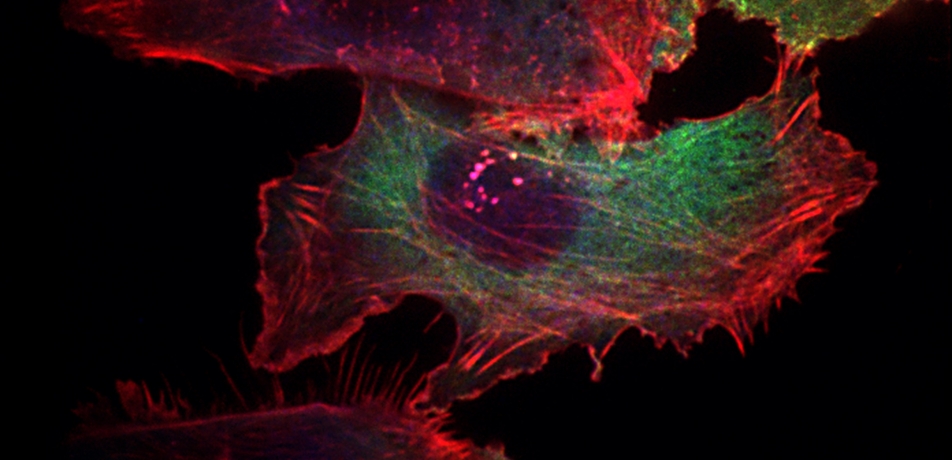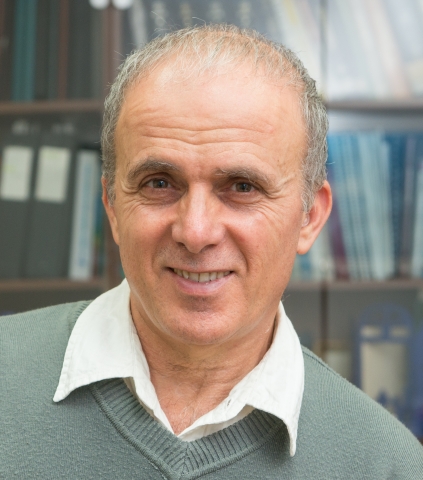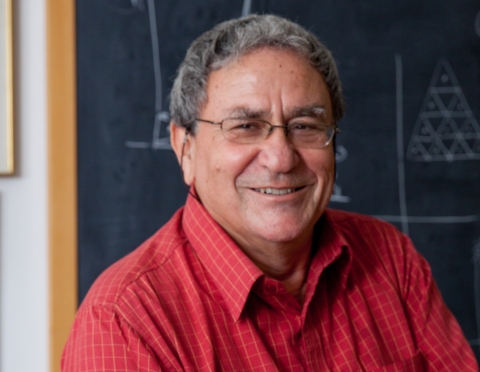Deadly night owl
Research shows: tumors grow faster during sleep
Features

The photo above shows a group of human breast cancer cells.
In a surprise finding that was published in Nature Communications, Weizmann Institute of Science researchers showed that cancer grows and spreads most at night.
The findings suggest that administering certain treatments in sync with the body’s day-night cycle could boost treatment efficacy.
“It seems to be an issue of timing,” says Prof. Yossi Yarden of the Department of Biological Regulation (pictured at right), who headed the study with Prof. Eytan Domany from the Department of Physics of Complex Systems (pictured below left). “Cancer treatments are often administered in the daytime, just when the patient’s body is suppressing the spread of the cancer on its own. What we propose is not a new treatment, but rather a new treatment schedule for some of the current drugs.”
This finding arose out of an investigation into the relationships between different receptors in the cell. The receptors - protein molecules on the cell’s surface or within cells - take in biochemical messages secreted by other cells and pass them on, into the cell’s interior. One of the receptors, EGFR, promotes the growth and migration of cells, including cancer cells.
Another, the so-called ‘stress hormone’, is responsible for the body’s state of alertness. The two
interact with each other, in a kind of biochemical wrestling match. The outcome of that match, the scientists discovered, is that when the stress hormone is suppressed - during sleep - the first receptor is most active.
To test the relevance of the finding on treatment, the scientists gave Lapatinib, one of the new generation of cancer drugs used to treat breast cancer, to mice with cancer at different times of the day and night. They found that the treatment was most effective at the mice’s resting phase of the 24-hour cycle, when tumor growth was most active. Their conclusion: Administering certain anti-cancer drugs at the resting phase of the day - for humans, nighttime - could be more effective and efficient for combating cancers.
This is just one example of the importance of connecting basic research to translational research in the fight against cancer. The planned Weizmann Institute Integrated Cancer Center (ICC) will do just that by linking cutting-edge basic cancer research to translational research in cancer prevention, early diagnosis, and treatment. The ICC will take advantage of the world-renowned strength of the Weizmann Institute in multidisciplinary research to tackle the complexity of cancer, and provide leads that will be explored towards translational research.
Prof. Yosef Yarden is supported by the Dr. Miriam and Sheldon G. Adelson Medical Research Foundation, the Maurice and Vivienne Wohl Biology Endowment, the Louis and Fannie Tolz Collaborative Research Project, and the European Research Council. He heads the Marvin Tanner Laboratory for Research on Cancer and is the incumbent of the Harold and Zelda Goldenberg Professorial Chair in Molecular Cell Biology.
http://www.weizmann.ac.il/Biological_Regulation/Yossi_Yarden
Prof. Eytan Domany is supported by the Leir Charitable Foundations, Mordechai Segal, Israel, and the Louis and Fannie Tolz Collaborative Research Project. He is the incumbent of the Henry J. Leir Professorial Chair.

Prof. Yossi Yarden

Prof. Eytan Domany








